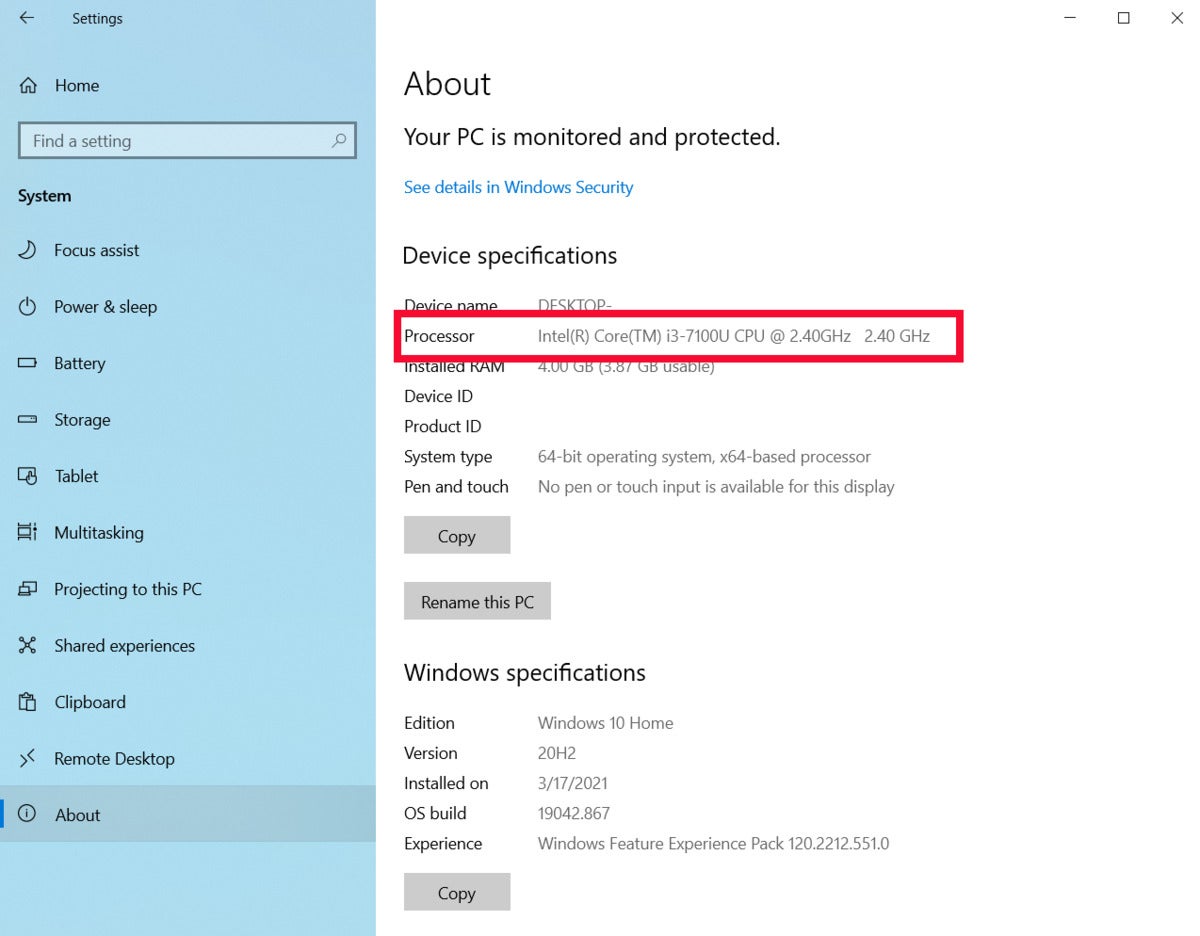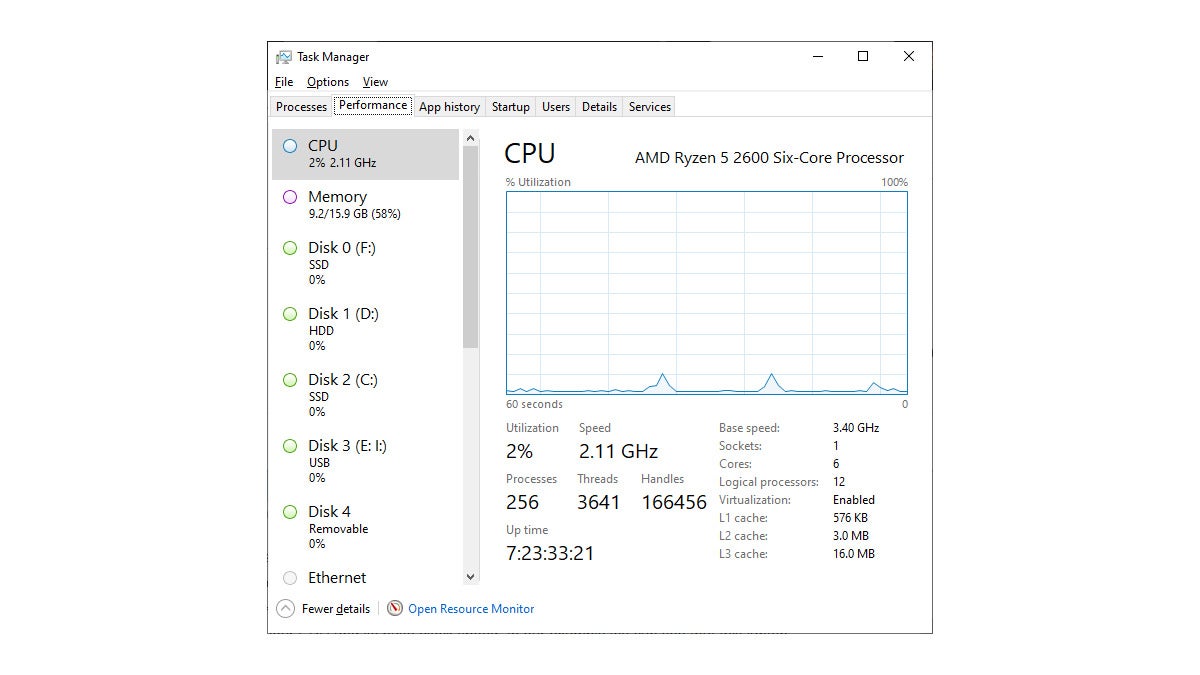Which CPU do I have and how fast is it? How to check - zamoradrecandlere1979
Do you experience which CPU you have, you said it double-quick it runs? And is IT fast enough to run Windows 10 at a able crop? The latter question we can answer rightfulness away: Eastern Samoa long as you induce a PC-compatible CPU manufactured in the last five years, there's little cause to think IT can't run Windows 10. The minimum Windows 10 processor spec is meet 1GHz, after all.
There are several restrictions for older processors, though, and in these cases you'll want details on which CPU you're running. Sandy Bridge processors from 2011, for example, can run to begin with versions of Windows 10, but those chips have been phased out and aren't supported by newer builds of the operating system.
If you have a modern processor and you're uneasy about how well your PC is running, consider additive upgrades such as adding more Drive or getting an SSD for basal aboard storage. This bequeath likely give your system the boost it needs—even for machines track turn down-end CPUs.
If, however, your PC needs to carry impermissible high-performance tasks such as video editing or video rendering, then getting to know your Processor is a good musical theme. You may find it's time for a CPU upgrade
How to find your CPU details in Windows
 IDG
IDG Windows 10's Settings app can assure you your CPU's constitute and base speed.
First, let's start with quickly reckoning out which processor you have. In Windows 10, pat the Windows Key + the letter "I" happening your keyboard to open the Settings app. From there go to System > Most. Scroll weak to the "Device specifications" heading, and you'll reckon the public figure of your CPU and its base clock speed. In our example we can see that this laptop is functional a "Kaby Lake" Intel Core i3-7100U with a base speed of 2.4GHz.
 IDG
IDG The Windows 10 Task Manager displaying info about an AMD Ryzen processor.
If you want a little many information, then type Task Manager into the Windows 10 search bar to launch this service program. Expand the Task Manager from its basic state away clicking More details. Under the Performance lozenge in the new window, information technology'll show your CPU name, the base speed, the number of cores and togs (logical processors), and the size of it of your respective caches. Therein example, we have a six-gist Ryzen 5 2600 currently running at 2.11GHz, with a Qaeda hurrying of 3.4GHz
Either approach to determining your processor is a discriminating start, but here's the job with CPUs: Those basic specs Don't tell you much about how well the processor actually works. The pestering bit about CPUs is that clock speeds (those numbers measured in gigahertz) are relative within a generation. For lesson, a 10-class-old dual-core 2.5GHz Sandy Bridge processor is not the homophonic as a plural-core 2.5GHz Comet Lake processor from last class.
The same goes for a simple core count. While generally more helpful than look clock speeds, a high core count still won't necessarily tell you if one CPU is improved than another 'tween generations. In that respect bottom be dramatic composition jumps in performance, and—when comparison across a wide enough generation gap—a CPU with fewer cores can beat out an older processor with more cores.
The differences in both cases are payable to improvements in CPU design, instruction set, book of instructions per cycle (IPC), and other changes. The freighter line is that different generations of processors are not easily comparable along paper.
A newer processor is generally the faster option, but non always… which is wherefore the best course of action is to benchmark your Central processing unit and compare it to otherwise systems. Comparisons can be done online, as many CPU bench mark tests either have made-up-in comparison charts, or there are third-political party sites that Host results from other users, as we explained in our how-to benchmark your PC tutorial.
You can also follow along with our CPU reviews here at PCWorld, and run some of the same tests we do for compare. Just keep in idea that our reviews use high-last components that buns help squeeze out a little more execution from a system than mid-range parts.
If you can't make up bothered with running tests, you can run down sites like UserBenchmark that leave nip and tuck comparisons of any two processors supported a database of user-provided benchmarks. These data doesn't amount from research lab-quality try results, simply they should impart you a all-purpose idea of performance.
If even out that is excessively much of a hassle, so you can rely on a basic pattern to guide your conclusion along whether to upgrade: If your PC stops upgrading to newer versions of Windows 10, or incremental upgrades like RAM and SSDs Don River't noticeably meliorate system public presentation, then upgrading to a more modern processor is likely in order.
Source: https://www.pcworld.com/article/394351/which-cpu-do-i-have-and-how-fast-is-it-how-to-check.html
Posted by: zamoradrecandlere1979.blogspot.com


0 Response to "Which CPU do I have and how fast is it? How to check - zamoradrecandlere1979"
Post a Comment